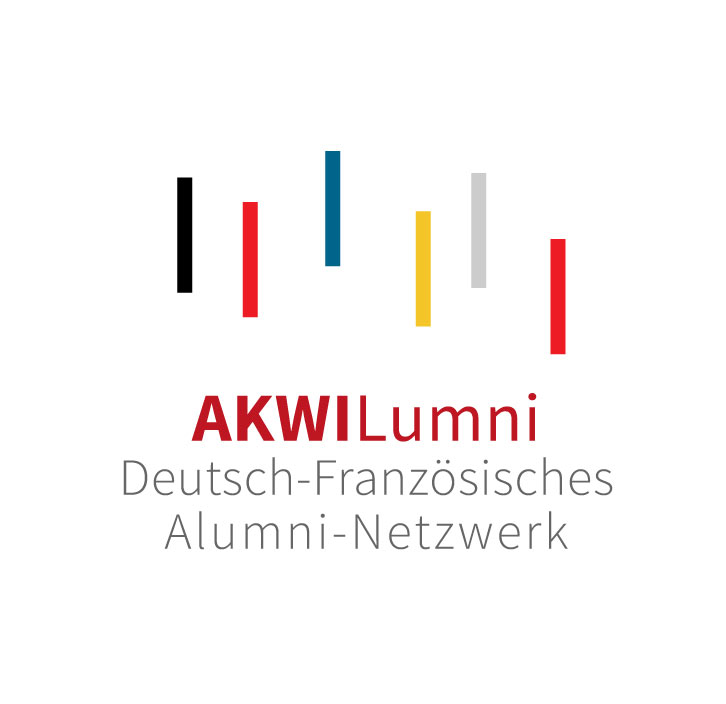Strengthening intercultural relationships
Franco-German alumni network founded at the University of Wuppertal
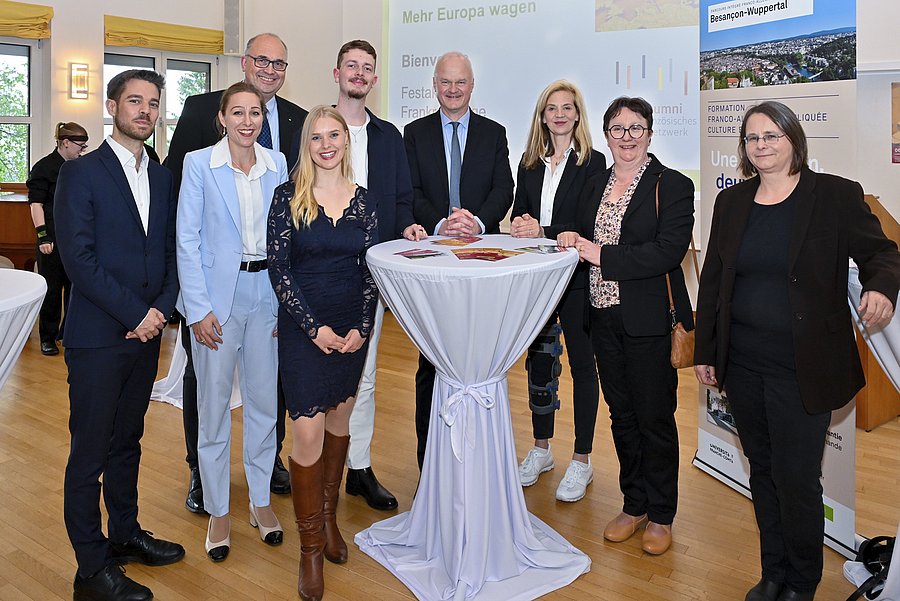
From left: the university attaché of the French embassy for NRW Dr Matthieu Osmont, the Wuppertal degree programme coordinator Dr Laura Wiemer, vice-rector Prof. Dr Peter Gust, the degree programme speakers Annika Meier and Martin Lepan, the French consul general Dr Etienne Sur, Dr Ursula Egyptien as representative of the DAAD in Paris, from Besançon degree programme coordinator Dr Laurence Jehle-Blanc and dean Prof. Dr Ursula Kocher. // Photos (4) Michael Mutzberg
Numerous supporters of the Franco-German study programme took the opportunity to attend the ceremony in person in Wuppertal on Wednesday evening. In addition to the French Consul General Dr Etienne Sur, the university attaché of the French Embassy for North Rhine-Westphalia, Dr Matthieu Osmont, as well as Dr Ursula Egyptien, representing the German Academic Exchange Service in Paris, and Dr Laurence Jehle-Blanc, programme coordinator on the French side, were also present when the network, called AKWILumni, was presented to the public for the first time.
Professor Peter Gust, Vice-Rector for Third Mission and International Affairs at the University of Wuppertal, emphasised the importance of the established network in his welcoming address: "This is another piece of the puzzle of our diverse activities in France at the BUW, with which we are also strengthening the Franco-German European idea: In cooperation with our partners, we are determined to set an example for democratic engagement. In the context of the Franco-German degree programme and its newly founded network for graduates and sponsors, this means empowering and encouraging young talent to shape the future of both countries and Europe together."
Dr Laura Wiemer was particularly pleased about the lively interest in the ceremony. She heads the Franco-German degree programme on the Wuppertal side and is the initiator of the network: "Our graduates can make valuable contributions to understanding between Germany and France and, more broadly, within the EU. During their studies, they learn to perceive cultural diversity not as a threat, but as an enrichment. These acquired competences should have the broadest possible impact through the strategic networking of science, business, culture and society in both countries," says Wiemer.
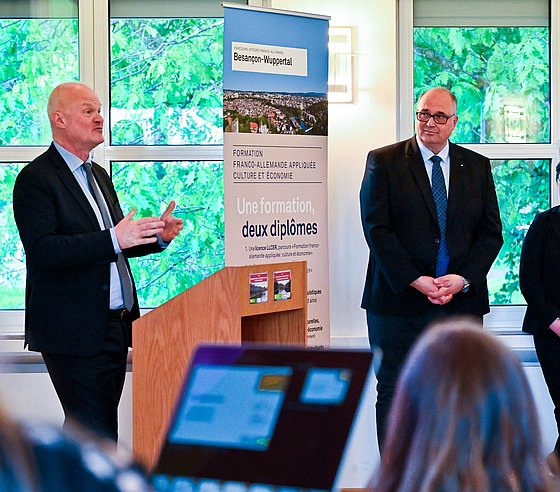
Greetings from the supporters of Franco-German co-operation, ...
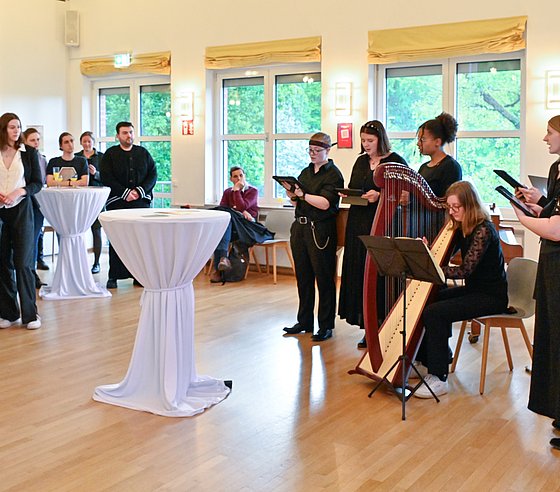
... musical accompaniment by the music education choir ...
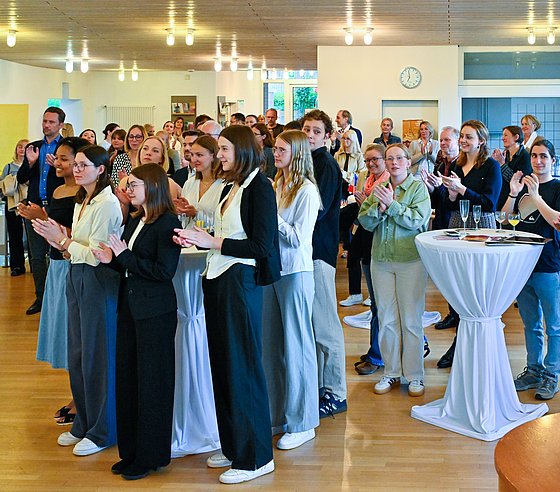
... and numerous guests, who accompanied the launch of the alumni network, made the evening perfect.
More background information
The University of Wuppertal and the Université Marie et Louis Pasteur (formerly Université de Franche-Comté) in Besançon jointly offer the Franco-German Bachelor's degree programme "Applied Cultural and Economic Studies" (AKWi) and the Master's programme "Applied Franco-German Studies: Culture, Economy and Sustainability" (AKWiNa), which builds on this. Wuppertal students acquire and practise intercultural skills by learning together with their French fellow students from the partner university in Besançon from the outset and completing a year of study in France.
As far as career entry is concerned, the Bachelor's and Master's programmes qualify students for all those cultural contexts in which business and economic expertise is required in addition to language practice. At the same time, they aim to open up career prospects in companies in the private sector in which linguistic and (inter)cultural competences play a key role.
In addition to companies and agencies that are active on the Franco-German market, other potential employers include associations such as chambers of foreign trade, the German and French embassies in the respective partner country, consulates or Franco-German cultural associations such as the Institut Français or the Goethe-Institut and funding organisations such as the Franco-German Youth Office or the German Academic Exchange Service. The Master's degree also qualifies graduates to remain in academia.
Double degree
The respective Franco-German degree programme (Bachelor's or Master's) leads to two equivalent national degrees - upon successful completion, students receive a certificate from the University of Wuppertal as well as a licence certificate from the Université Marie et Louis Pasteur in Besançon. They also receive a diploma from the Franco-German University, which combines the two national certificates and is internationally recognised.
Join the network
The Franco-German alumni network welcomes all former AKWi and AKWiNa students and staff to become part of the constantly growing network between Wuppertal, Besançon and the Franco-German cultural and business world. Partners interested in working together are also invited to get in touch and exchange ideas at any time. Be it out of interest in France and Franco-German relations or out of interest in promoting the study programmes.
Further information on the German-French degree programmes AKWi and AKWiNa

